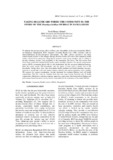| dc.description.abstract | To mitigate the income-erosion effect of illness and vulnerability of the poor households, BRAC, an indigenous Bangladeshi NGO, integrates Essential Health Care (EHC) activities with its microcredit-based poverty-alleviation interventions. The EHC delivers preventive and basic curative health services to the villagers through Shasthya Sebika (SS) who is the community health worker selected from among the village-based women's credit group members who is willing to provide voluntary services, and acceptable to the community she serves. The SSs receive four weeks basic residential training backed up by regular monthly refreshers. For specific programmes such as DOTS, community-based ARI, or safe motherhood, the SSs are given additional training. Each SS covers around 250 households, and she makes at least once a month visit to the households. During these visits, they disseminate health, nutrition and family planning messages, motivate to install tube-wells and sanitary latrines, identify and register pregnancy cases, identify TB suspects for sputum examination, provide treatment for common illnesses and sell health commodities. The SSs work on voluntary basis but earn some income from the sale of health commodities. Meticulous selection, training, supportive supervision, functional referral linkage and performance-based incentives are key factors responsible for the sustenance of the model till date. | en_US |

